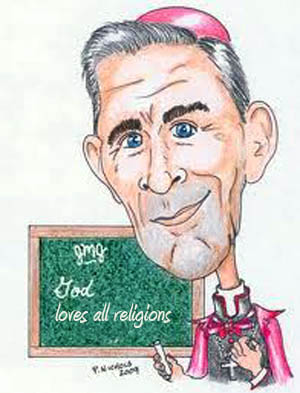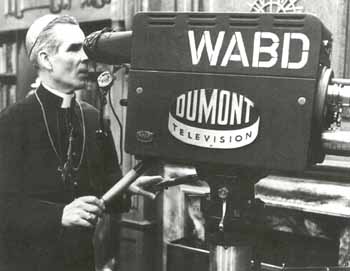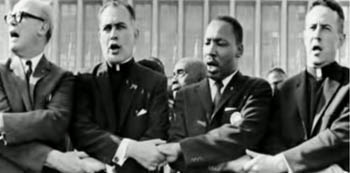 |
Traditionalist Issues
Fulton Sheen, an Ardent Ecumenist
Patrick Odou
Although Archbishop Fulton J. Sheen died in 1979, seven years before the first Interreligious Conference at Assisi, I believe it is safe to say that he would have been very much at home at that pan-religious gathering, whose 25th anniversary will be celebrated this year by Benedict XVI.
After reading Archbishop Sheen’s autobiography Treasure in Clay, (1) it became clear to me that he was a strong proponent of progressivist ecumenism. Like the present day progressivists, Sheen saw “truth” and “goodness” in every religion as he wrote: “The combination of travel, the study of world religions and personal encounter with different nationalities and peoples made me see that the fullness of truth is like a complete circle of 360 degrees. Every religion in the world has a segment of that truth.” (p. 148)

Sheen: All religions lead to salvation |
His ecumenical ideas went so far that he was an implicit supporter of the theory of “anonymous Christian” defended by Fr. Karl Rahner. Indeed, Sheen pretended that “Christ is hidden in all world religions, though as yet His face is veiled as it was to Moses, who asked to see it.”
Then, he explicitly reaches the same conclusion of Rahner when he said: “I have always contended in talking to missionaries that we are not so much to bring Christ to peoples as we are to bring Christ out of them.” (p. 148)
The heresy of universal salvation was also latent in his mind as he affirmed: “The good Hindu, the good Buddhist, the good Confucianist, the good Moslem are all saved by Christ and not by Buddhism or Islam or Confucianism but through their sacraments, their prayers, their asceticism, their morality, their good life.” (p. 148)
He was so convinced that everyone could be saved in his own religion that he never used his shows to convert people. Even though he spent hundreds of hours on television, this Prince of the Church, whose mission should be to bring souls to Our Lord and into His flock, stated without remorse that on his television show “never once was there an attempt at what might be called proselytizing.” (p. 73)
It is not superfluous to remember that Sheen was national director of the Society for the Propagation of the Faith. One wonders what kind of propagation of the Faith was his, which never once attempted to convert others…
A supporter of Protestantism
Sheen recommended that priests read commentaries of the Bible by Protestants in order to assimilate their erudition and spirituality. Their commentaries, he pretended, were unequaled sources, superior to any he knew, including all the Catholic ones. Addressing priests he suggested:
“The first subject of all to be studied is Scripture, and this demands not only the reading of it, but the study of commentaries. For practical purposes and for the busy priest, I have found no commentary to equal the Daily Study Bible of William Barclay [from the Protestant Church of Scotland], which appeared in about 15 small volumes. Protestant commentaries, I discovered, were also particularly interesting because Protestants have spent more time of Scripture than most of us. In general, I found Arthur W. Pinks’s [a Protestant, staunchly Calvinist and Puritan] three-volume Exposition of the Gospel of St. John to be one of the best from a spiritual point of view.” (Page 79)

In my televison programs I've never tried to convert anyone |
Sheen even preached retreats for Protestant ministers and instructed them to practice a type of “Holy Hour.” Not a true Holy Hour where the Faithful pray before the Blessed Sacrament, but a “Holy Hour” prayed before Protestant “Scripture.” Sheen proudly recounts the origin that:
“Most remarkable of all was the effect the preaching of the Holy Hour had on non-Catholic ministers. I preached three retreats to Protestant ministers - on two occasions to over three hundred in South Carolina and in Florida, and on another occasion to a smaller group at Princeton University. I asked them to make a continuous Holy Hour of prayer in order to combat the forces of evil in the world, because that is what Our Lord asked for the night of His Agony.
“I addressed them: ‘You are not blessed with the same Divine Presence in your churches that I believe we possess. But you do have another presence that we do also, and that is the Scripture. At the Vatican Council [II] we had a solemn procession of the Scriptures into the Council every morning as a form of the Presence of God. You could make the Hour before the Scriptures.’ Many came to me later to inquire about the Eucharist, some even asked to join with me in a Holy Hour before the Eucharist.” (p. 196)
By suggesting that Protestant ministers make this solemn veneration of Scripture, Sheen was encouraging them in their error. Instead of trying to convert them, Sheen confirmed them in their heresy, which considers the reading of the Bible as something comparable to the adoration we render to Our Lord who is truly present in the Eucharist.
When he stated that Protestant prayers were efficacious in “combating the forces of evil in the world,” he was also falsifying the truth, because the Catholic Church and her saints have always taught that Protestantism is in itself a major “force of evil in the world.”
It is also important to note that Sheen ignored the fact that what Protestants call Scripture or Bible is something quite different from the Scripture or Bible of the Catholics. The so-called Protestant Bible was created in the 1500’s during the Protestant Revolt. It is an adulteration of true Scripture. It changed a considerable number of parts and completely removed others. (2) It is not the Scripture of Our Lord but the writings of revolutionaries who rebelled against Our Lord in the 16th century. Fulton Sheen certainly knew this and yet he encouraged those Protestants to pray before that false “Bible.”
Sheen both encouraged and aided in the spread of Protestantism, and was proud of it. He wrote about an incident where he assisted in disseminating heresy:

Sheen encouraged Protestants to remain Protestants |
“Most remarkable of all was a telephone call I received early one morning in Los Angeles. The caller announced himself as Reverend Jack McAllister. He was most insistent that he see me. I told him that I was catching a plane for New York at midday and would be glad to see him at the airport before leaving.
“A very distinguished Christian gentleman appeared, Mr. Jack McAllister, who told me that he was engaged in a work of world evangelization, sending tapes on the Gospel to all parts of the world, and also mailing millions of copies of sermons and scriptures to every quarter of the globe: ‘There is one thing that seems to be missing in my world evangelism, and that is a spiritual practice which will make it successful. What would you recommend?’ I recounted how much I depended on a daily Holy Hour before the Eucharist, and then suggested that since he was not blessed with the Eucharist, he could ask all of his people to spend one continuous hour with the Scriptures, in prayer and reparation for the sins of the world.
“One year later I received a pamphlet from him entitled: ‘Jack McAllister writes to one hour watchers.’ A paragraph from that pamphlet reads: ‘Please … if you are honestly concerned about making Christ known to literally every creature - give God on hour every day. You are needed in God’s prayer-force to prepare for work in the totally un-evangelized areas of the world. Do you love them enough to pray? Will you “pay the price” of spiritual battle for one hour daily? Christ asked: “What, could you not watch with Me one hour?”’
“At the end of that first year, he wrote and told me that 700 ministers had pledged one hour a day.
“As I am now writing this book (about six years after our meeting in the airport) he sends this message: ‘We have now mobilized and trained over 100,000 One-Hour-Watchers. We are preparing to train an elite army to pray four to six to eight hours daily –“pray ye therefore”- the only solution to the problems related to World Evangelism.’” (pp. 196-197)
We can see that Archbishop Sheen considered the “World Evangelism” of this Protestant to be on par with the true Missionary work of the One, Holy, Roman Catholic, and Apostolic Church. He encouraged those poor heretics lost in the mire of Protestantism to practice a type of pseudo-sacrament - a “Holy Hour,” before a false symbol of Christ - the Protestant “Bible.”
As illustrated in these texts, we see that the hero of so many American conservatives was actually an ardent ecumenist and a promoter of Progressivism.
1. Treasure in Clay, The Autobiography of Fulton J. Sheen, San Francisco: Ignatius Press. reprinted 1993; originally published by the Society for the Propagation of the Faith, New York: Doubleday & Company, 1980.
2. The Protestant Old Testament omits seven entire books - namely, Tobias, Judith, Wisdom, Ecclesiasticus, Baruch, First and Second Machabees - and parts of Esther (10:14 to 16:14) and Daniel (3:24- 90; 13; 14). The Protestant New Testament changes passages in various books, e.g., 1 Cor 11:27, 1 Cor 7:9, Gal 5:17.

Posted January 31, 2011

Related Topics of Interest
 Fulton Sheen’s Flaws in Rhetoric Fulton Sheen’s Flaws in Rhetoric
 Sheen’s Co-Ownership Is Opposed to Catholic Teaching Sheen’s Co-Ownership Is Opposed to Catholic Teaching
 Bishop Sheen, an Enthusiast of Vatican II Bishop Sheen, an Enthusiast of Vatican II
 Fulton Sheen, a Fan of Teilhard de Chardin Fulton Sheen, a Fan of Teilhard de Chardin
 Is It Possible for Saints To Teach Errors? Is It Possible for Saints To Teach Errors?
 Newman's Continued Admiration for Anglicanism Newman's Continued Admiration for Anglicanism
 The Ecumenical Formation Newman Gave to Youth The Ecumenical Formation Newman Gave to Youth
 What about the Orthodoxy of Mother Teresa? What about the Orthodoxy of Mother Teresa?

Related Works of Interest
|
|
Traditionalism | Hot Topics | Home | Books | CDs | Search | Contact Us | Donate

© 2002- Tradition in Action, Inc. All Rights
Reserved
|
 |
|